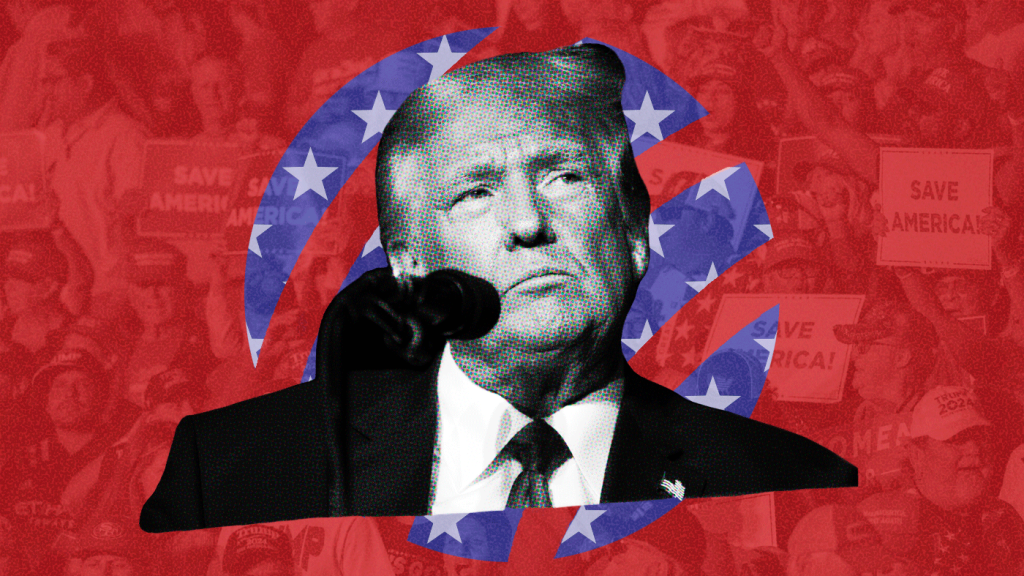Donald Trump targets Canada, Mexico, and China with new tariff measures.
Newly elected United States President Donald Trump has announced his plans to impose a 25% tariff on imports from Mexico and Canada, along with an additional 10% tariff on Chinese goods.
Trump said on Monday that these measures would take effect on his first day in office, stating they would remain until irregular border crossings and drug trafficking were “stamped out.”
“Both Mexico and Canada have the absolute right and power to easily solve this long-simmering problem,” Trump posted on his social media platform, Truth Social.
Also read: Sadiq Khan blames Trump of attacking him over ethnicity, religion
“We hereby demand that they use this power, and until such time that they do, it is time for them to pay a very big price!”
Trump’s most aggressive trade stance
Trump’s statement marks one of his most aggressive trade stances since his 2016 administration.
He further criticized China for allegedly failing to address fentanyl smuggling into the United States.
“Drugs are pouring into our country, mostly through Mexico, at levels never seen before,” he claimed, adding that China had not enforced penalties on fentanyl trafficking despite prior commitments.
The president-elect’s proposals, which include previously floated tariffs of up to 60% on Chinese goods, could disrupt global trade dynamics and raise questions about the future of the US-Mexico-Canada Agreement (USMCA), which Trump himself had signed to replace NAFTA.
International response
The announcement sparked immediate responses from Canada and China.
Canadian Deputy Prime Minister Chrystia Freeland defended the bilateral trade relationship, calling it “balanced and mutually beneficial.”
Freeland emphasized Canada’s commitment to border security and its role in combating fentanyl trafficking.
Also read: Mexico refuses to accept any migrants deported by Texas under new state law
“Canada buys more from the United States than China, Japan, France, and the UK combined,” Freeland noted, underscoring the economic ties between the two nations.
Ontario Premier Doug Ford expressed alarm over the tariffs, describing them as “devastating” for workers and industries.
“We need a Team Canada approach and response—and we need it now,” Ford wrote on X.
China, the US’s largest trading partner, responded with caution.
A spokesperson for China’s Embassy in Washington stated that “no one” would win a trade war, emphasizing the mutually beneficial nature of US-China trade.
Economic problems
The proposed tariffs have already shaken international markets, causing a drop in the Canadian dollar, Mexican peso, euro, and several other currencies against the US dollar.
Economists have warned of inflationary pressures in the US and potential repercussions for global growth.
“Tariffs can lead to higher inflation in the US, making it harder for the Fed to cut rates,” Gary Ng, a senior economist at Natixis, told Al Jazeera.
“This benefits short-term US growth but hurts global economies.”
Future of USMCA at stake
Critics have raised questions about the future of the USMCA, a landmark free trade deal encompassing Canada, Mexico, and the United States.
Trump’s proposed tariffs could hurt the agreement’s core principles, which are based on free trade.
“The president-elect’s tariff changes could effectively end NAFTA by definition,” Tim Harcourt, an economist, explained. “Non-fentanyl goods will also get caught in the crossfire.”
The US’s top three trading partners—Canada, Mexico, and China—accounted for $1.43 trillion in imports in 2022, according to official data.
Economists fear broad-based tariffs could raise the cost of everyday goods for American consumers while dampening global trade.
While Trump’s supporters argue that the tariffs could encourage the return of manufacturing jobs and strengthen the US’s hand in trade negotiations, experts caution that the fallout could undermine long-term economic stability.
